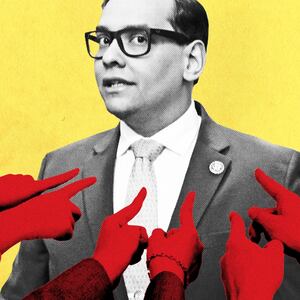The tawdry and extraordinary chapter of “Congressman” George Anthony Devolder Santos is at an end—now the United States House of Representatives has expelled the New York Republican.
For many, it is a funny story. The conman became a congressman. Another lurch downward in America’s political deterioration. But the deeper lessons of the Santos story haven’t been learned—and they speak to America’s relationship with itself, our media, and the truth in the public square.
It was nearly four years ago that I was called to meet this unlikely person. As a former Republican congressional candidate myself and the publisher of the North Shore Leader—an established weekly newspaper on Long Island’s north shore, aka, the “Gold Coast”—it wasn’t unusual for would-be candidates to seek me out for political advice or support. But right from the start, I sensed this guy was a fraud.
Santos came to me through the leader of a former local Tea Party group—to me a decent and a dedicated woman. But both she and Santos indicated right off that she was a paid member of his staff. That told me that the relationship was basically mercenary.
And then Santos got weird: He giggled and boasted, basking gleefully at being the center of attention. He lied—in ways that were as off-putting as they were obvious. He proclaimed, “I am a very rich person…” although, “I don’t like to brag.”
He claimed his mother was a rich Brazilian finance executive—although he knew nothing of Brazilian finance or its upper-class society. He made a big deal about being gay—broadcasting his sexual preferences as a talisman—in a way I’ve seen no other gay politicians do. To me, he seemed to be a flamboyant faker. Every subsequent encounter reinforced that.

George Santos speaks during the Republican Jewish Coalition (RJC) Annual Leadership Meeting at the Venetian Las Vegas on Nov. 19, 2022.
David Becker for the Washington PostA month later, I ran into him at the New York Athletic Club, where he cornered me outside a political reception. He fulminated against the Queens GOP chairwoman who was not supporting him, calling her “a bitch.” Way too familiar and way too reckless.
Santos took that flamboyance and his willingness to lie and manipulate—and say and do anything—to two runs for U.S. Congress.
During his second run, my colleagues at the North Shore Leader wrote three exposé stories on Santos in Sept. and Oct. 2022. Although we are nearly all Republicans, we endorsed the Democratic nominee, Robert Zimmerman, without reservation.
We slammed Santos in print as a “fraud” and “fabulist.” We identified multiple fake entries in his federal campaign and disclosure filings—some of which he now is under indictment for. And we exposed some of the ridiculous lies he was telling voters.
Zimmerman took our articles, and spent hundreds of thousands trying to broadcast those charges.
By October, “everyone in the know” knew that there was “something wrong with Santos.” Suffolk Republican leaders banned him from their rallies. Nassau Republican leaders edged him to the back of the stage. And national Republicans knew Santos’ staff were impersonating future Speaker Kevin McCarthy’s staff.
But the major media had their narrative (two gay candidates opposing each other)—and ignored the deeper story of Santos’ sociopathic fraud and lies. No one from the major media called to ask “What’s the story with this Santos?” The Leader remained the only media to expose Santos before the election.
Santos ended up winning in Nov. 2022 in a district that had been unexpectedly redrawn in June 2022 by New York’s top court into a “leans-Republican” district. It was a race he wasn’t supposed to win, in a district that was originally drawn to be a non-competitive “solid Democrat” district, in an election year that was surprisingly successful for New York Republicans (especially on Long Island).
After the North Shore Leader’s “breaking” the Santos fraud story was vindicated by the journalism of The New York Times and other major media, much was made of the importance of local media—and the need to integrate news flows between local and regional and national media. But sadly, little has changed.
After exposing Santos, The Leader has also revealed the truth of two other Long Island political politicians—both of whom were also federal candidates—and found out things about them that the public really ought to know. Both of those are great news stories—about some deep political fraud and dishonesty—yet not one major media outlet has followed-up.
One lesson that should have been learned by the George Santos Affair—which is that local news is crucial and can often affect national politics—has gone unheeded. Sure, everyone knows about Santos now, and as a result he’s getting kicked out of Congress. But the reason he was found out in the first place was because local journalists were paying attention, when the national media was focused on a narrative.
There will always be more political scammers looking to climb the rungs of power. Unless we change the nature of information-sharing within our media ecosystem, the story of George Santos is likely to be repeated—but it doesn’t have to be.








